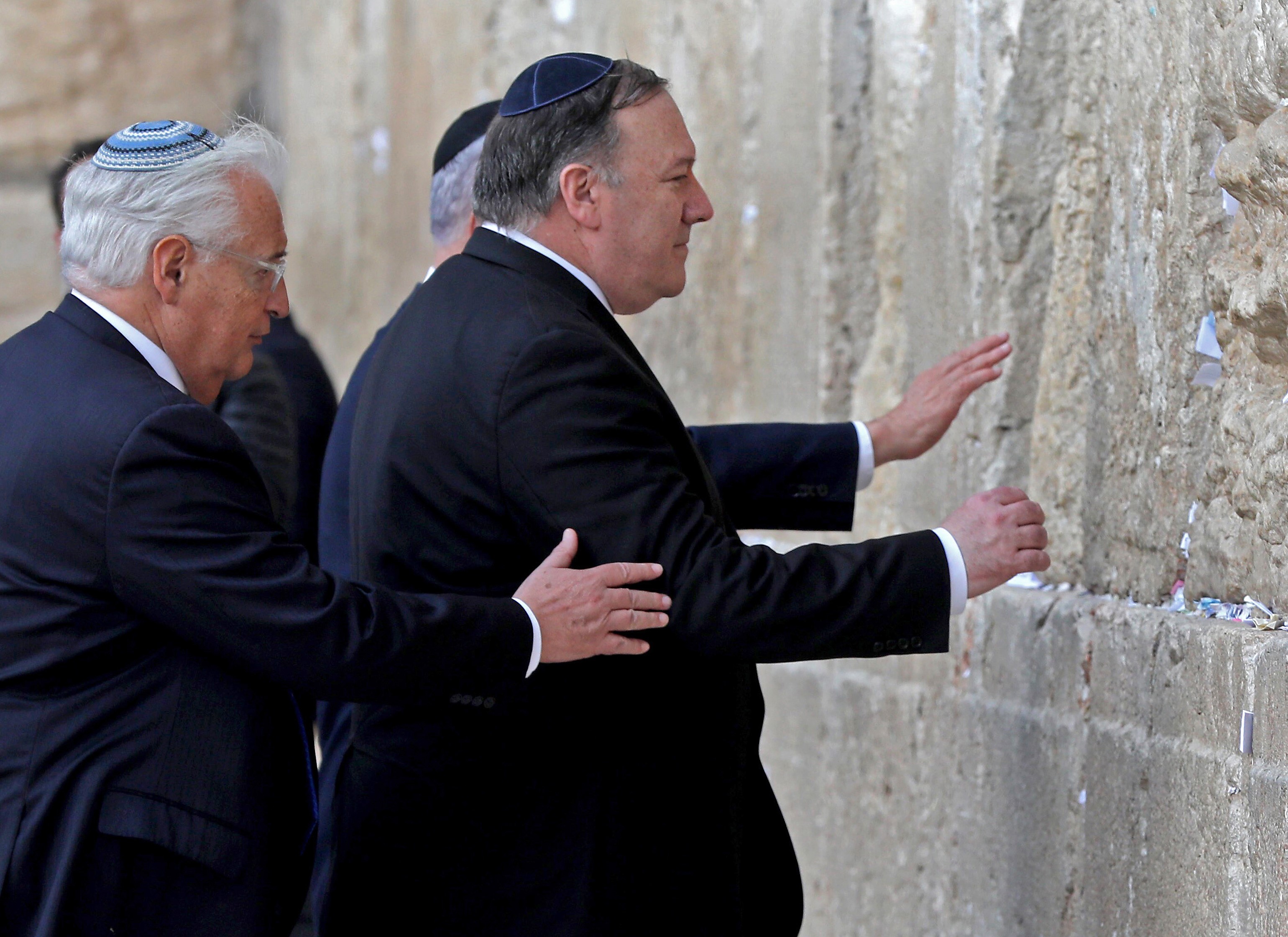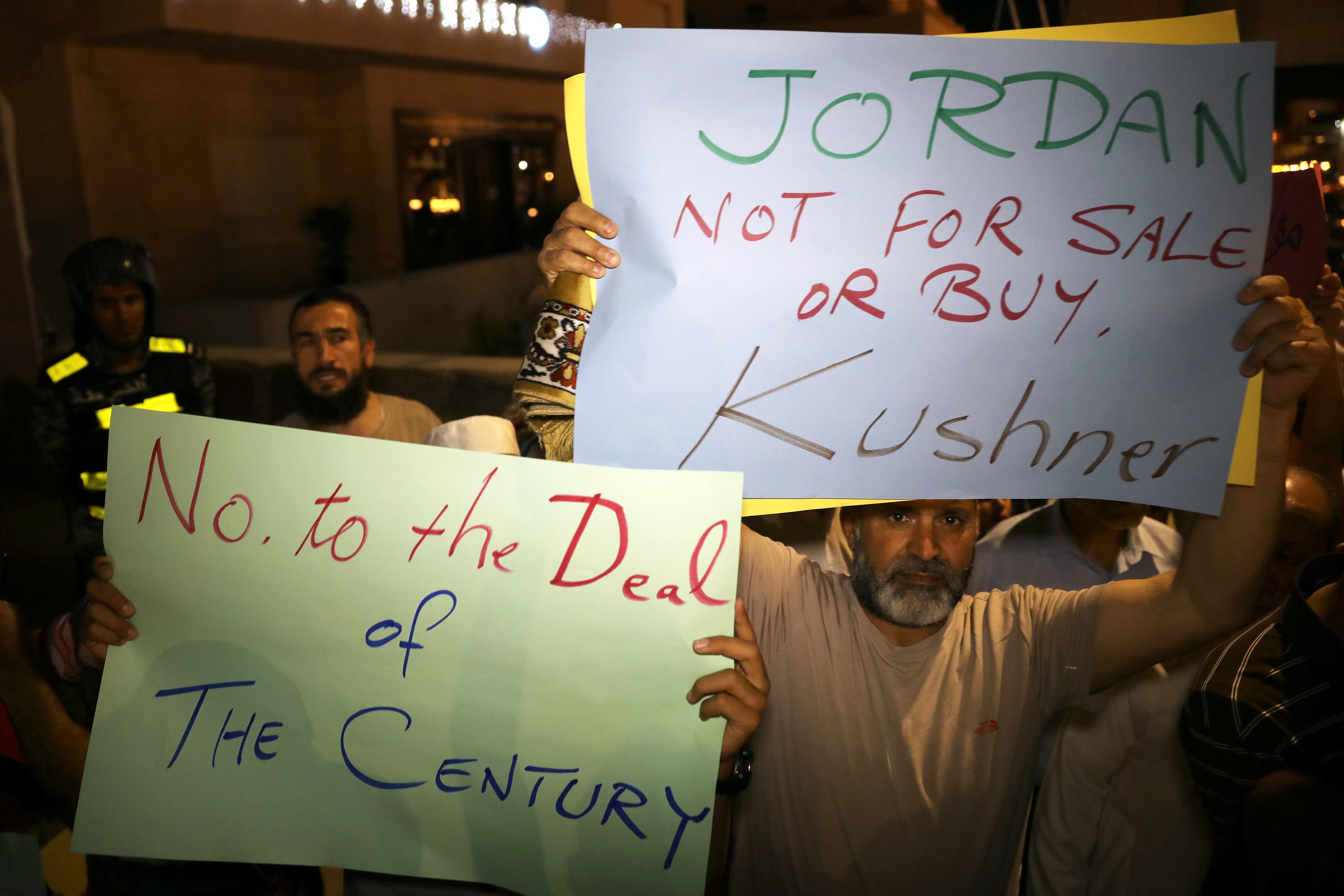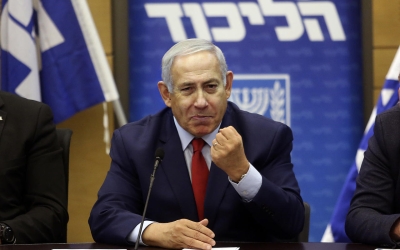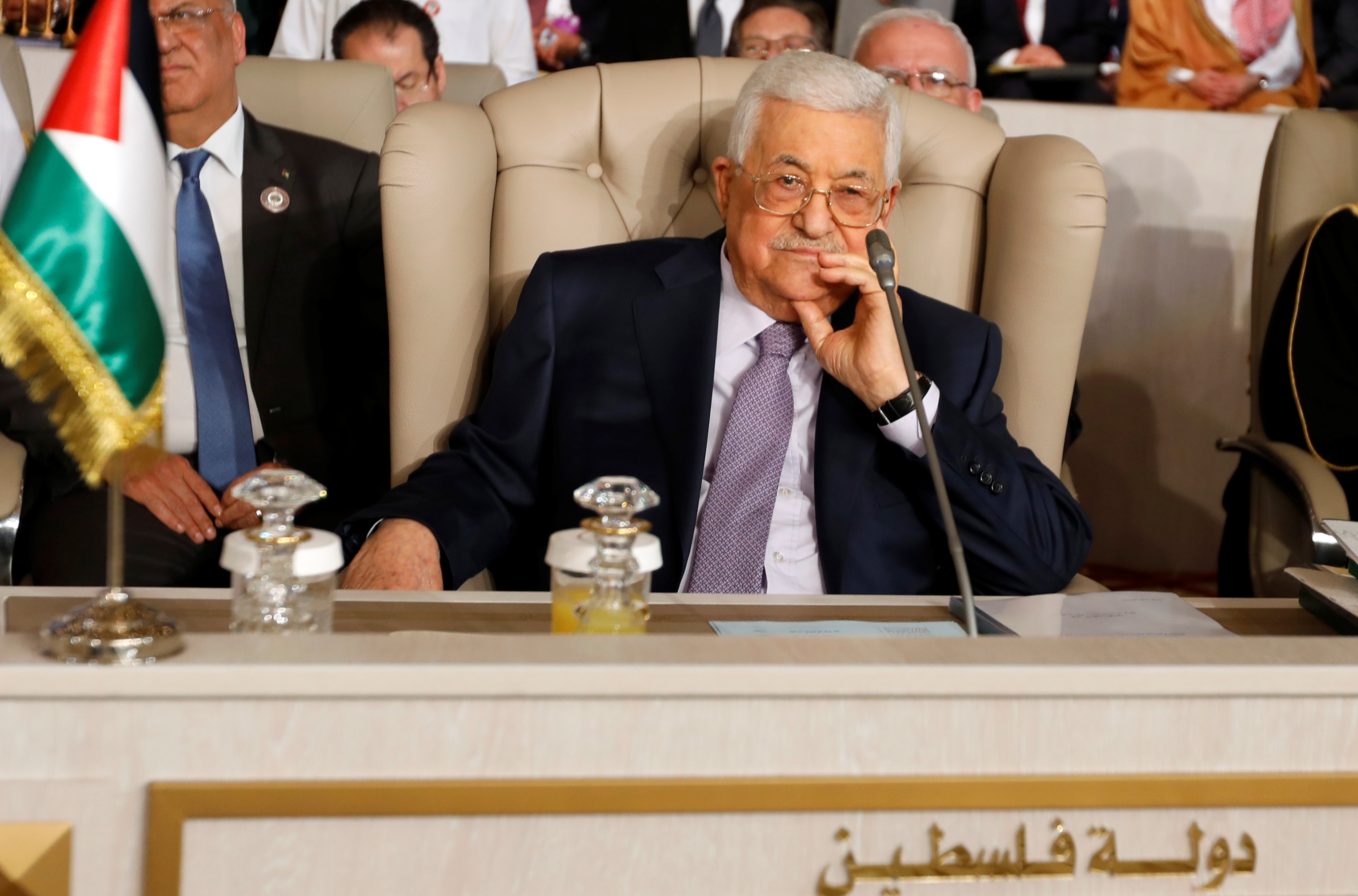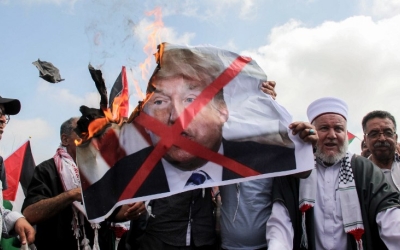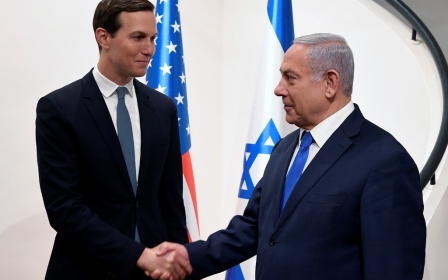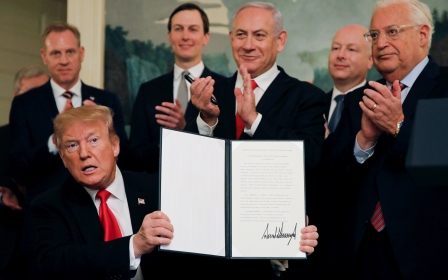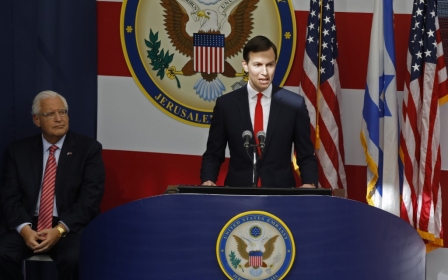Why I'm optimistic about the 'deal of the century'
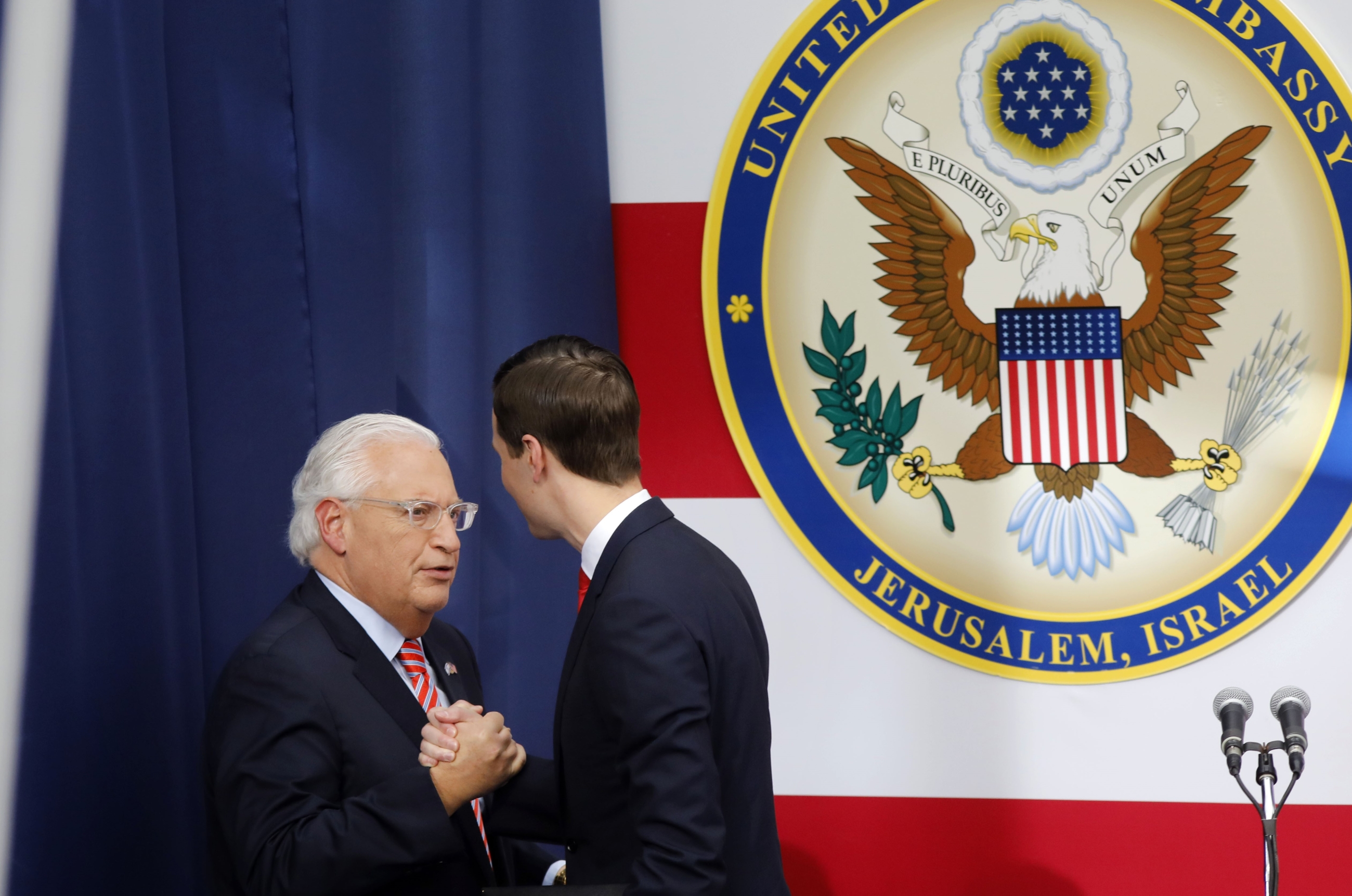
In selling the yet-to-be-published "deal of the century" (DoC), its principle authors have said the following:
That the Palestinians are not yet capable of governing themselves (US president's son-in-law Jared Kushner); that Israel has a right to annex parts of the West Bank (US ambassador to Israel David Friedman); and that the deal itself is probably unexecutable (US Secretary of State Mike Pompeo).
With friends like these, who needs enemies?
Killing the peace deal
In so brazenly and unashamedly entrenching Israel’s gains and trashing any possibility of a Palestinian state with East Jerusalem as its capital, in dealing with the heavy weight of refugees' history by simply deleting it, the authors have done more than autodestruct.
They have killed too the idea that a peace deal can ever be constructed around the principle of a Jewish majority state living alongside a Palestinian one as an equal and stable neighbour.
The deal of the century is nothing more than declaring 'mission accomplished', as other invading armies have done in the Middle East
This myth has spent too long in the intensive care unit of international negotiations. It has fuelled almost three decades of negotiations and it still lives on at the core of European policy.
It dominated and displaced all other ideas.
For 26 years after the Oslo accords there was no process other than the peace process. The Palestinian leadership, that recognise Israel, would never have declared it over on their own. But nor was Oslo's demise the work of the rejectionist factions like Hamas, Islamic Jihad or Hezbollah. On the contrary, in rewriting its charter with the purpose of lessening the distance between it and Fatah, Hamas accepted the Green Line in 1967 as a basis for negotiations.
No, the gravediggers of the two-state solution are two zealots: Kushner and Friedman. They essentially believe Israel has won this conflict and all that the resolution of it requires is for the defeated party to accept this truth and take the money.
A 'mission accomplished'?
The DoC is nothing more than declaring "mission accomplished", as other invading armies have done in the Middle East. History teaches us that such pronouncements are premature.
Kushner, whose every public outing has turned into a PR disaster, has given the game away on several occasions.
Kushner and Friedman are the mortal enemies of liberal Zionism, which was a secular project, precisely because they believe they are on a mission from God
Not least in his interview with Robert Satlov of the Washington Institute, where he declared that his quest was based on “truthing”. First truth: Jerusalem is the capital of Israel. Second truth: Israel had the Golan Heights for 52 years, so he did not think there is “any question” that that it too should be part of Israel.
Does truth here mean recognising reality, or facts on the ground? Not entirely. He referred again to the truth in his joyous, messianic opening to his speech at the dedication ceremony of the US embassy in Jerusalem.
“I am so proud today to be in Jerusalem, the eternal heart of the Jewish people," Kushner said, his face flush with revelation, adding, ”(President Trump said) he would finally recognise the truth, that Jerusalem is the capital of Israel."
Truth here means the fulfilment of divinely ordered destiny. Kushner and Friedman are the mortal enemies of liberal Zionism, which was a secular project, precisely because they believe they are on a mission from God. Listen to Kushner describing Israel, in the same speech, as paradise on earth - “the only land in the Middle East where Jews, Muslims and Christians participate and worship freely... the protector of women’s rights... one of the most vibrant nations of the world” - and you get the picture.
No truth, no self-determination, no national aspiration, no history, no water, no land, no olive groves, other than Israel’s, can exist in the land between the river and the sea in Kushner’s book and the Palestinians simply have to accept this truth.
What goes on in Kushner's and Friedman's head is being acted out in grotesque reality by settlers. As the farmers of al-Mughayyir and Kufr Malek villages prepared to celebrate Eid al-Fitr, Israeli settlers set fire to their crops, repeatedly.
As if to underline this, while Kushner has been in the Middle East, Ron Dermer, Israel’s ambassador to Washington, has been trying to prevent a bipartisan resolution from the Senate endorsing a two-state solution.
To say this so firmly and so clearly on behalf of Israel’s biggest sponsor is to hasten the day when the project to secure and seal a state based on the principle of religious supremacy comes to an end, and for that reason I am profoundly grateful to Kushner and Friedman. They are doing a good demolition job.
But there are other reasons too.
The Bahrain 'workshop'
It has been a tough slog to get Arab leaders to attend the economic conference - now downgraded to a workshop - in Bahrain at the end of the month, when the money for this deal was due to be pledged.
Jordan, Egypt and Morocco have apparently agreed and Qatar will be there as well.
No Arab government can ignore the Palestinian struggle, or do anything other than say they can only support a deal that the Palestinians themselves accept
But their reluctance to do anything other than listen is based on the firm realisation that no Arab head of state could endorse such a plan. That’s as great a truth, as big a fact on the ground, as the fundamentalist Kushner himself can hatch.
Kushner was reported to be taken aback by the level of opposition his plan is getting among friends. Kushner’s WhatsApp date, Mohammed bin Salman, the crown prince of Saudi Arabia, assembled a focus group of government officials, intellectuals and newspaper columnists to road test the DoC.
“He seemed to have been surprised when he learned that the majority of people in the room were critical of his plan and told him that King Salman emphasised the rights of the Palestinians," a source told the Washington Post.
If Kushner thinks about this - which he will not, because this process is not cerebral, it's an act of faith and then an act of force - it means the private conversations he has been having with Arab leaders are not a reliable source of information. He should not trust the things he is being told in private, precisely because they cannot be said in public.
Palestinian struggle back
Far from burying the Palestinian cause, after a long period where it was sidelined by the Arab uprisings of 2011, the counter-revolution, the rise of Islamic State group (IS), the deal of the century has managed to push this ancient struggle back where it belongs in the centre stage of Arab politics.
Once there, no Arab government can ignore it, or do anything other than say they can only support a deal that the Palestinians themselves accept.
That, again, is no mean achievement, and Kushner and Friedman are to be congratulated on that too.
The DoC however presents the biggest opportunity to those who have the most to lose from it.
Once they acknowledge they are never going to get a Palestinian state living in autonomy beside an Israeli one, the Palestinian leadership have their work cut out.
What should be done
The first task is to suborn petty rivalry, ego, and personal interest to the cause of unifying the leadership composed of all its parties. No Fatah leader can carry on treating Hamas as a bigger foe than Israel.
No Palestinian leader can represent his people if he is vetted first by Israel and Washington.
If the Palestinian president, Mahmoud Abbas, really wanted to send a signal to Israel about the DoC, he would stop, or even suspend, security co-operation with the occupation forces. They would get the message overnight.
If Abbas really wanted to send a signal to Israel about the DoC, he would stop, or even suspend, security co-operation with the occupation forces
The second task ahead is to develop a joint programme of protest, civil disobedience and action. If the occupation has never been cheaper for Israel, make it more expensive.
The third task is to use the embassies it has got round the world to lobby for the diplomatic recognition of the Palestinian state and lobby each political party in Europe to make recognition a reality. You can not fight a highly active pro-Israel lobby around the world with inaction. Get active.
End of conflict
There are many elements which would form the basis of an end of conflict - Hamas’s offer of a long-term hudna is one of them. A post-Oslo generation of Palestinian youth yearning for leadership is another. It does not have to be one person.
It could be collective.
A new generation of 1948 Palestinians whose demand for equality is the cornerstone of the next phase of this struggle is yet a third. The one state option, or some version of it, is the only one capable of unifying and ultimately liberating all Palestinians from their carefully constructed ghettos.
There is, however, one option that is not on the table. And that is doing nothing.
There has been an active debate among those who follow these events in granular detail about why a political declaration is needed at all, as Netanyahu is getting all he needs - Jerusalem, Golan Heights, defunding of UNWRA - without it.
This has been expressed in a number of ways, one of them being that the deal is designed to fail, to give Netanyahu and Trump the excuse of saying there is no partner for peace.
A line in the sand
I am still inclined to think that the DoC will be published, although the longer it is delayed, the more it interferes with Trump’s re-election campaign. For one reason. Like the Clinton Parameters before it, it will be a line in the sand, whose purpose is to bury all other lines before it, principally the Green Line of 1967, which has disappeared entirely.
Plans are just as lethal as bullets. Allow this line in the sand to be drawn and the Palestinians may just as well take the money, give up and watch Abu Dhabi rise on the shores of Gaza.
I don’t think the Palestinian people, who have been through hell in the last seven decades, will give up. They are less likely to give up now than at any time before. That’s why I am optimistic.
The views expressed in this article belong to the author and do not necessarily reflect the editorial policy of Middle East Eye.
This article is available in French on Middle East Eye French edition.
Middle East Eye propose une couverture et une analyse indépendantes et incomparables du Moyen-Orient, de l’Afrique du Nord et d’autres régions du monde. Pour en savoir plus sur la reprise de ce contenu et les frais qui s’appliquent, veuillez remplir ce formulaire [en anglais]. Pour en savoir plus sur MEE, cliquez ici [en anglais].



